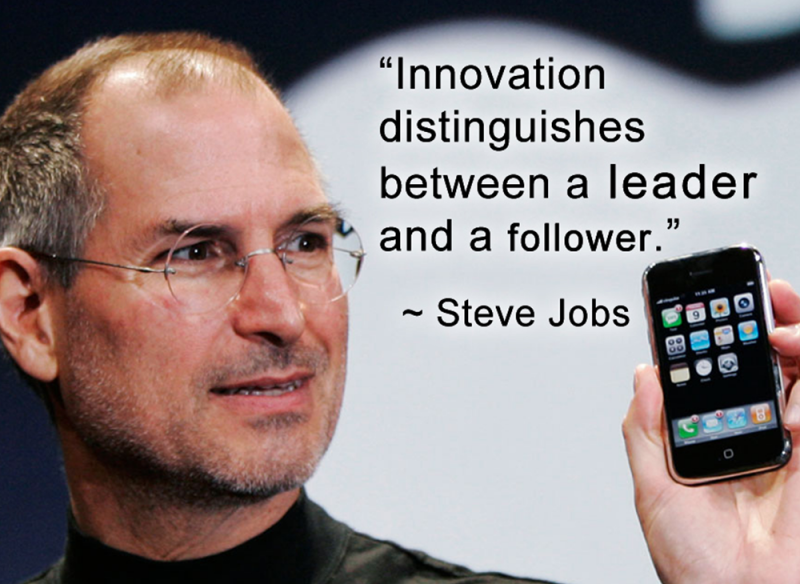Google may be innovative, but Apple’s ability to focus is also important.
A week ago, I was on CNBC’s Squawk Box and, in response to a question, said that I thought that Google was more innovative than Apple at the moment. I added that Apple, which is led by a very strong team, would likely reassert its innovative edge this year by releasing one or two new products.
My thinking was based on a sense that Google’s purchase of Nest was part of an integrated strategy. This includes Google Maps and Street View (products that were not only innovative but well-executed), Nest, driverless cars, Android, Google+, and even fibering up a city like Kansas City. For better or worse (I guess that’s up for each user to decide), Google will be able to offer an environment in which all of our data and preferences are seamlessly integrated.
This reminded me of Steve Jobs’s “digital hub” strategy of a decade ago. The iPod was remarkably beautiful and well executed, but it was not — on its own — wildly innovative. We all had MP3 players before it came along. The innovation that made the iPod so successful, besides its beauty, was that Apple seamlessly integrated iPods, iTunes software, the iTunes store, and later iPhones, iPads, and the entire iOS realm and cloud. Users got enveloped into this carefully cultivated garden.
My CNBC remark that Google was being more innovative than Apple stirred up a bit of discussion in corners of the blogosphere and Twitterverse. I realized that I may have conveyed a belief, which I do not hold, that “innovation” is all that matters. Innovation is wonderful, but on its own it’s not the holy grail. Other things matter just as much in creating a great company or product, most notably execution and focus.
Apple excels at these things. That’s why I use an iPhone and iPad.
Innovation without execution produces footnotes to history, such as the Xerox Alto and Star. Steve Jobs saw the innovations at Xerox PARC and, due to his relentless drive for execution and focus, was able to produce, thirty years ago this week, the Macintosh.
 A few months before Steve Jobs died, Google’s Larry Page, who lived only three blocks away, paid him a visit. They had been feuding, to put it mildly, over an issue of innovation: whether Google’s Android system had ripped off the look and feel of Apple’s iOS. But Jobs was pleased to patch things up personally and offer Page some advice. “The main thing I stressed was focus,” Jobs recalled. “Figure out what Google wants to be when it grows up. It’s now all over the map. What are the five products you want to focus on? Get rid of the rest, because they’re dragging you down. They’re turning you into Microsoft. They’re causing you to turn out products that are adequate, but not great.”
A few months before Steve Jobs died, Google’s Larry Page, who lived only three blocks away, paid him a visit. They had been feuding, to put it mildly, over an issue of innovation: whether Google’s Android system had ripped off the look and feel of Apple’s iOS. But Jobs was pleased to patch things up personally and offer Page some advice. “The main thing I stressed was focus,” Jobs recalled. “Figure out what Google wants to be when it grows up. It’s now all over the map. What are the five products you want to focus on? Get rid of the rest, because they’re dragging you down. They’re turning you into Microsoft. They’re causing you to turn out products that are adequate, but not great.”
His point remains a valid counterbalance to my comment that Google has recently been more innovative than Apple. I do think that Google has been more innovative, but I also think that Apple has remained more focused, and both are important when building a successful company.
Once a year, when he was healthy, Jobs took his most valuable employees on a retreat, which he called “The Top 100.” At the end of each, he would stand in front of a whiteboard (he loved whiteboards, because they engendered focus) and ask, “What are the ten things we should be doing next?” People would fight to get their suggestions on the list. Jobs would write them down and cross off the ones he decreed dumb. After much jockeying, the group would come up with a list of ten. Then Jobs would slash the bottom seven and announce, “We can only do three.” He made people focus.
I suspect (though I have no inside information) that Apple is focused on two or three innovations, some of which we may see this year. Maybe a television system that is integrated and simple, or a watch that will blow us away with its design, or a camera that can take multiple exposures instantly and combine them into a breathtakingly realistic image. If that happens, it will remind us that Steve Jobs and Apple realized that “innovation,” while a revered buzzword, is best when accompanied by focus and execution.
Walter Isaacson is the president and CEO of the Aspen Institute. He has been the chairman and CEO of CNN and the editor of TIME magazine. He is also the author of Steve Jobs (2011), Einstein: His Life and Universe (2007), Benjamin Franklin: An American Life (2003), and Kissinger: A Biography (1992), and coauthor of The Wise Men: Six Friends and the World They Made (1986).

